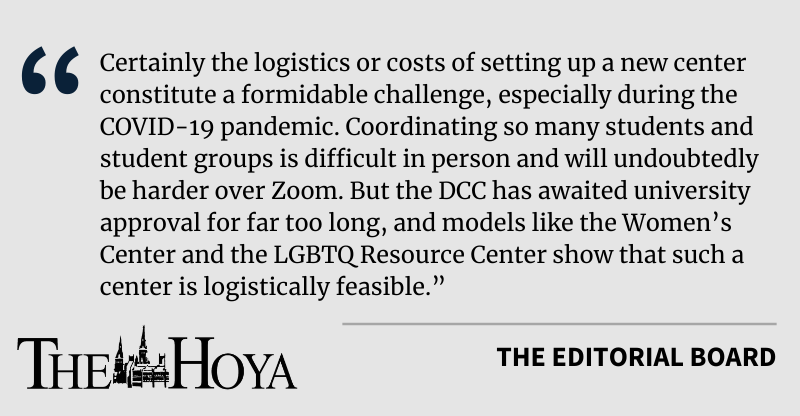No student should face obstacles — physical or institutional — to their education or university resources.
The Editorial Board calls on Georgetown University to create a Disability Cultural Center to consolidate resources for disabled students and offer a designated space for disabled students and allies. Georgetown has failed to follow through on the center since students first pushed for its establishment more than eight years ago, a failure that has emblematized the other ableist barriers that disabled Georgetown students face. Finally establishing the center would be a significant step forward in building a more inclusive community for students that Georgetown has historically neglected.
Lydia Brown (COL ’15), a Georgetown faculty member, led the first efforts to create a center for disabled students in the fall of 2012. Brown organized a planning committee of more than 20 university community members to plan and advocate for the creation of the center. But after two years of advocacy and meeting with university administrators, Brown reported in a 2014 Viewpoint for The Hoya that ableism remained prevalent on campus while Georgetown’s leadership failed to commit to any substantive policy or funding changes.
Establishing a DCC would be a crucial first step to confronting ableism on campus, especially accessibility or advocacy problems. Such a center would draw inspiration from the LGBTQ Resource Center and would provide a campus hub with professional staff for Georgetown’s disabled community. It could also coordinate with other disability advocacy groups on campus, like Active Minds and the Georgetown Disability Alliance, and support its members with social programming, guest speakers, peer mentoring and networking opportunities.
Advocates’ aspirations for the DCC are noble, and the university should support them. Georgetown’s commitment to values like care for the whole person and community in diversity requires that it offer these valuable services to disabled students. As professor Libbie Rifkin, the founding director of Georgetown’s Disability Studies program, noted, the DCC is an important step toward fulfilling the university’s commitment to its students.
“A Disability Culture Center is a crucial step towards building a truly inclusive, caring community at Georgetown,” Rifkin wrote in an email to The Hoya. “Georgetown students are whole people; their needs extend well beyond the classroom. A DCC would provide a place where students can develop disability pride and community and cultivate a sense of belonging.”
The university did take some action — after Brown graduated — to fulfill the recommendations that Brown’s planning committee made for combating campus ableism. In 2017, Georgetown approved the creation of a disabilities studies minor, which teaches students to analyze the cultural significance of disability and explore social reactions to physical and mental differences. Beyond this change, according to a university spokesperson, Georgetown has worked to expand campus accessibility in line with the regulations of the Americans with Disabilities Act.
“We are continuing facility enhancements across campus to ensure ADA compliance. We have made significant progress expanding accessibility and it remains at the forefront of campus planning for facility improvements and construction,” the spokesperson wrote. “In addition to our overall efforts to improve campus accessibility, we respond to special student needs as they arise, as well as soliciting input from students with disabilities on these issues.”
Despite the university’s steps to improve accessibility and education around disabilities, students continue to face the kinds of accessibility problems — like doors without push-to-open buttons and buildings without adequate ramps or elevators — described in Brown’s 2014 Viewpoint, indicating the university has not gone far enough to improve conditions for disabled students.
In 2018, members of the Georgetown University Student Association exposed Pedro Arrupe, S.J. Hall for its failure to offer automatic push-to-open buttons on doors that require more than five pounds of force to open, as required by the ADA. Another of the university’s main academic buildings, White-Gravenor Hall, did not even implement an ADA-compliant ramp at its main entrance until 2019.
These failures to accommodate disabled students impact them beyond just creating accessibility challenges. Because the university has never offered a central community for the disabled community and its allies on campus, disabled students are often left to advocate for themselves. The lack of a center for disability advocacy and awareness has immensely worsened the burden of ableism on disabled students, according to Gwyneth Murphy (SFS ’23), a member of GUSA’s Accessibility Policy Team.
“Disability and ableism have consistently ranked last as an issue on both student and adult minds,” Murphy wrote in an email to The Hoya. “When people are unwilling to understand and prioritize disability, advocacy falls on the disabled. This is, in many ways, unsustainable and cruel.”
Certainly the logistics or costs of setting up a new center constitute a formidable challenge, especially during the COVID-19 pandemic. Coordinating so many students and student groups is difficult in person and will undoubtedly be harder virtually. But the DCC has awaited university approval for far too long, and models like the Women’s Center and the LGBTQ Resource Center show that such a center is logistically feasible. In fact, Georgetown, as both a university and a community, must go beyond the DCC to address ableism on campus, according to Brown.
“Like all institutions of higher education, Georgetown’s practices and policies toward students, employees, and faculty are often profoundly ableist,” Brown wrote in an email to The Hoya. “This ableism is only reinforced by inaccessible and exclusionary campus infrastructure, pedagogical methods, and working conditions.”
Realizing Brown’s advocacy with a DCC is a necessary step for Georgetown to support its students and address campus ableism. But it cannot be the only one. Everyone in the Georgetown community — students, faculty and administrators — must take an active role in building a campus and community that is accessible to all.
The Hoya’s Editorial Board is composed of six students and is chaired by the opinion editor. Editorials reflect only the beliefs of a majority of the board and are not representative of The Hoya or any individual member of the board.









